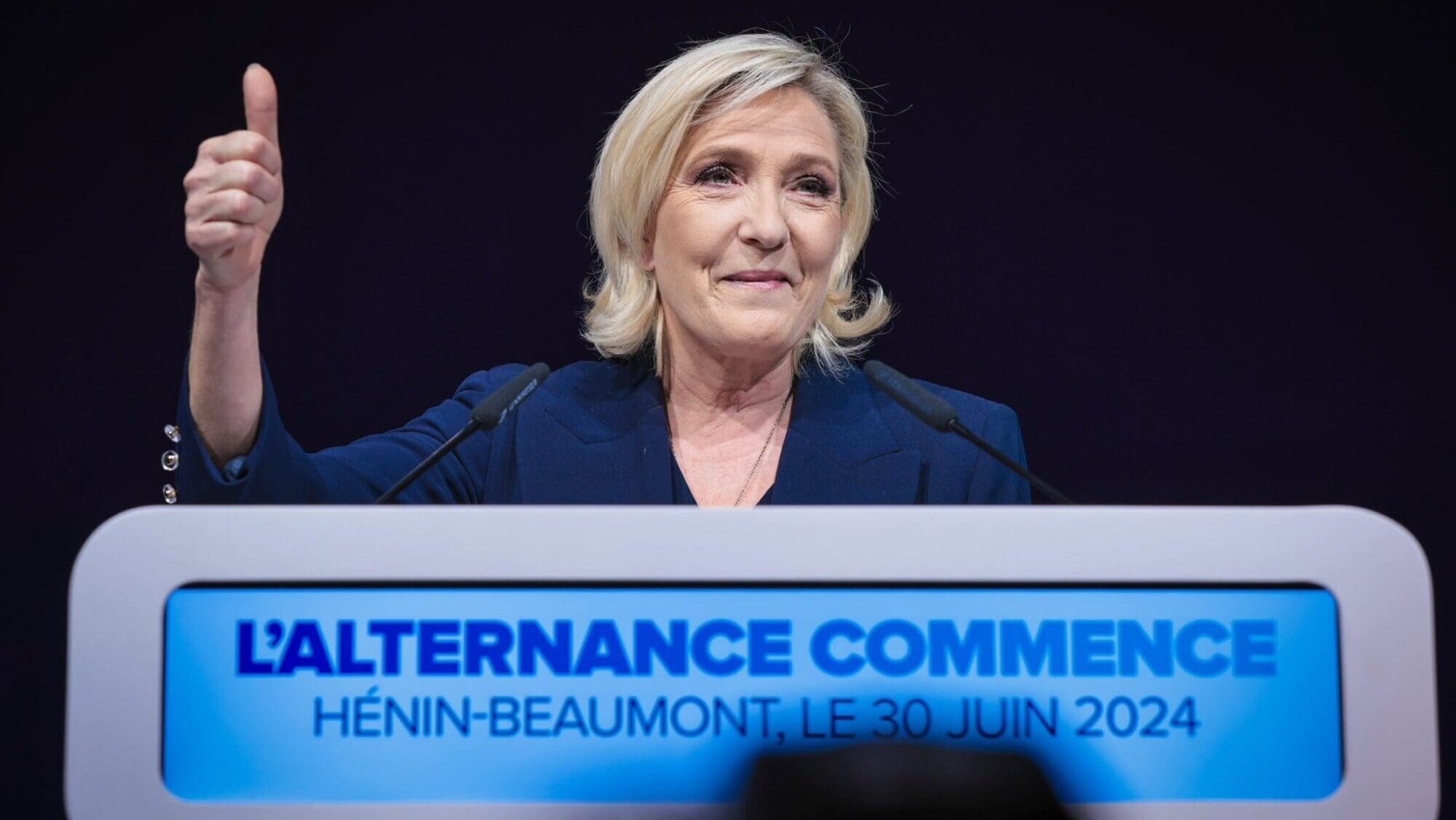
Marine Le Pen
Photo: @MLP_oficiel on X, 30 June 2024
Marine Le Pen’s national-conservative National Rally (RN) clearly won the first round of the French parliamentary elections on Sunday, June 30th, and is hoping to gain an absolute majority after the second round of voting on July 7th. French President Emmanuel Macron’s centrist Together alliance finished in a lowly third place, signalling voter dissatisfaction in the country.
The National Rally, which secured victory in the European elections only three weeks ago, prompting Macron to call snap elections, received 33.2% of the votes on Sunday, almost doubling its vote share of 18.7% from two years ago. This is RN’s best ever election result. The party is projected to have between 240 and 270 seats in the 577-seat National Assembly. 289 seats are required for an absolute majority. The total number of seats will depend on how the RN performs in the second round of voting. Altogether, only 75 MPs gained enough votes to be elected in the first round.
France, snap national parliament election:
— Europe Elects (@EuropeElects) July 1, 2024
Final results
RN and allies-ID: 33.2% (+14)
NFP-LEFT|G/EFA|S&D: 28% (+2)
Ensemble-RE: 20% (-6)
LR-EPP: 6.6% (-4)
Divers droite-*: 3.7% (+2)
Divers gauche-*: 1.5% (-1.5)
Divers centre-*: 1.2%
Far-left candidates-*: 1.2%
Regionalists-*:… pic.twitter.com/a5ffmQ13qn
“Nothing is won and the second round is decisive. We need an absolute majority so that Jordan Bardella is in eight days named prime minister by Emmanuel Macron,” declared Marine Le Pen. The party’s official leader and nominee for the prime ministerial position, Jordan Bardella, said, “The French people have handed down a clear verdict,” and he added he wanted to be the prime minister “of all French.” As the 28-year-old politician tweeted last night: “I will be the guarantor of your rights, your freedoms, and our republican motto, the one that unites all the people of France in the same promise: liberty, equality, fraternity.”
Je serai le garant de vos droits, de vos libertés, et de notre devise républicaine, celle qui unit tout le peuple de France dans une même promesse : liberté, égalité, fraternité.
— Jordan Bardella (@J_Bardella) June 30, 2024
Faites le choix de dirigeants qui vous aiment autant qu'ils aiment la France. #Législatives2024 pic.twitter.com/sgdBICcLtc
The runner-up of the first round was the New Popular Front, an alliance of left-wing parties, led by the hard-left Jean-Luc Mélenchon and his La France Insoumise party. The alliance finished on 28%, up from 25.7%, and is predicted to get 180-200 seats.
The political forces allied around Emmanuel Macron only managed to get 20.8%, a 5-point decrease compared to its results two years ago. According to the polls, Together is on course to get 60-90 seats. The president called for a “broad” democratic alliance against the National Rally for the second round. His current prime minister, Gabriel Attal, warned that the “far right is at the gates of power,” and “not a single vote must go to the National Rally” on July 7th.
Leaders of both the New Popular Front and Macron’s centrist alliance made clear on Sunday night they would withdraw their own candidates in districts where another candidate was better placed to beat the RN in Sunday’s runoff. Meanwhile, National Rally lawmakers urged centre-right politicians in the Republican party to withdraw from districts where such a move would work in RN’s favour.
The only other party to get a significant share of the vote on Sunday was the centre-right Republicans with 10.2% and a projected 30-50 seats. Éric Zemmour’s right-wing Reconquête party, National Rally’s bitter rival, only managed to garner 0.8%.
As we reported, Marine Le Pen’s victory is not surprising, but the logical outcome of changes in French society. Pollster and essayist Jérôme Fourquet explained that “the three ‘i’s: insecurity, immigration, and inflation” played a big part in how Macron’s presidency has been perceived, and why the anti-immigration National Rally has been riding high in the polls.
"[Next] Sunday, by voting for our candidates, you will ensure that the country rediscovers, in unity and fraternity, the energy to become one.
— The European Conservative (@EuroConOfficial) June 30, 2024
My dear compatriots, on this June 30, 2024, hope was reborn in our country. On July 7, mobilize so that the people can win!" —… https://t.co/uwWYHG70df
Macron has pledged to see out the remainder of his final presidential term, which runs until 2027, but he will likely be forced to appoint a prime minister from an opposition party. While the president determines the country’s foreign, European and defence policy, the parliamentary majority is responsible for passing domestic laws, like pensions and taxation.
Only the second round will make clear whether Le Pen’s party gets the absolute majority they would need to comfortably form a government and then start to implement their promises to dismantle many of Macron’s key policies and foreign policy platforms. That would include stopping French deliveries of long-range missiles to Ukraine in the war against Russia. The RN plans to roll back Macron’s pension reforms and promises to boost voters’ spending power.
